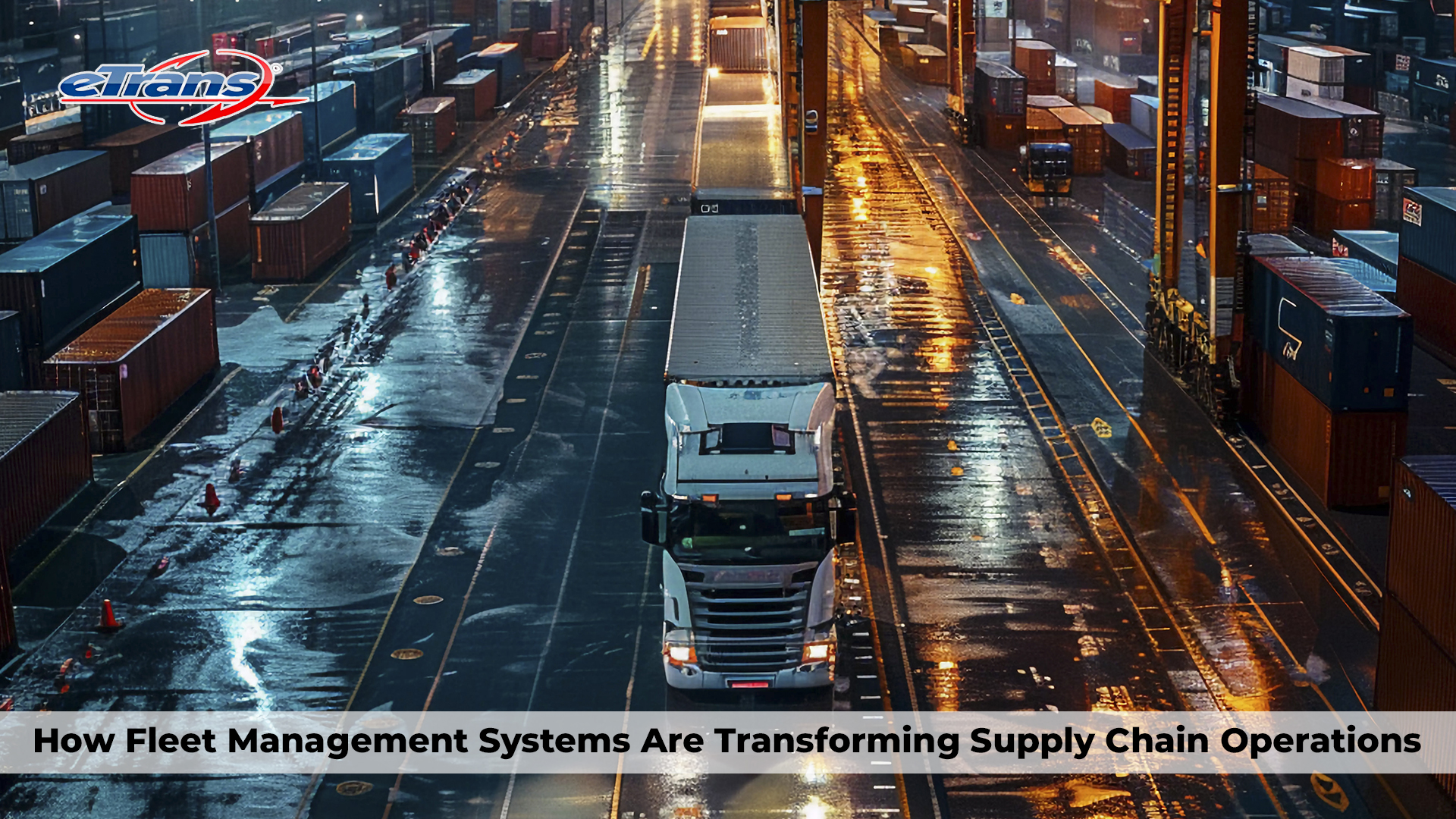Introduction
Supply chain operations face numerous challenges, from real-time tracking to cost optimization in today’s hyper-active business world. Harsh but true! Well, if you’re struggling with inefficient fleet management, you’re not alone. Many businesses grapple with the complexities of coordinating vehicles, drivers, and deliveries.
However, the good news? Fleet management systems are revolutionizing the industry, offering solutions to these pressing issues. By implementing these systems, you can streamline operations, reduce costs, and improve customer satisfaction.
Let’s explore how these innovative tools are reshaping supply chain dynamics and why they’re crucial for staying competitive in the modern marketplace.
1.The Role of Fleet Management Systems in Real-Time Supply Chain Visibility
Fleet management systems are game-changers when it comes to real-time GPS monitoring. These systems provide up-to-the-minute data on vehicle locations, traffic conditions, and delivery status. This level of transparency is invaluable for supply chain managers who need to make quick decisions and keep customers informed.
With real-time visibility, businesses can:
– Track shipments accurately.
– Predict arrival times with greater precision.
– Respond swiftly to unexpected delays or route changes.
– Improve communication with customers and stakeholders.
By leveraging telematics systems, companies gain insights into every aspect of their fleet’s performance. This data-driven approach allows for more efficient resource allocation and better overall supply chain management.
2.Optimizing Last-Mile Delivery with Fleet Management Systems
The last mile of delivery is often the most challenging and costly part of the supply chain. Fleet management systems play a crucial role in optimizing this final stretch. By combining them with delivery management systems, businesses can significantly improve the efficiency and accuracy of last-mile operations.
Key benefits include:
– Smarter route planning to avoid traffic and reduce delivery times.
– Real-time updates to customers about their package status.
– Improved driver efficiency through turn-by-turn navigation.
– Better allocation of resources based on delivery demands.
These improvements lead to higher customer satisfaction rates and lower operational costs, making fleet optimization a win-win for businesses and consumers alike.
3.How Fleet Management Systems Enhance Inventory and Asset Tracking
Integrating fleet management systems with inventory management tools creates a powerful synergy. This combination allows for more effective tracking of both vehicles and the goods they transport. As such, asset management software becomes an integral part of the supply chain, offering real-time updates on stock levels and locations.
Benefits of this integration include:
– Accurate inventory forecasting.
– Reduced cases of stockouts or overstocking problems.
– Improved asset utilization across the fleet.
– Enhanced theft prevention and recovery of lost assets.
By linking vehicle tracking solutions with inventory systems, businesses gain a complete view of their supply chain, leading to more informed decision-making and streamlined operations.
4.Improving Route Planning and Fuel Efficiency in Supply Chains Through Fleet Management Systems
One of the most significant advantages of fleet management systems is their ability to optimize routes and improve fuel efficiency. Advanced fleet tracking software uses algorithms to determine the most efficient routes, considering factors like traffic, weather, and delivery windows.
Key improvements include:
– Reduced fuel consumption through optimized routes.
– Decreased idle time and unnecessary mileage.
– Lower carbon emissions, supporting sustainability goals.
– Improved on-time delivery performance.
These fuel management systems not only cut costs but also contribute to a more environmentally friendly operation, aligning with growing consumer demands for sustainable business practices.
5.Leveraging Fleet Management Systems for Predictive Maintenance in Supply Chain Operations
Predictive maintenance is a game-changer in supply chain operations. Fleet Management Systems use vehicle diagnostics to anticipate maintenance needs before breakdowns occur. This proactive approach ensures smoother supply chain flow and reduces costly downtime.
Benefits of predictive maintenance include:
– Reduced vehicle breakdowns and unexpected repairs.
– Optimized maintenance schedules based on actual vehicle usage.
– Extended vehicle lifespan through timely interventions.
– Lower overall maintenance costs.
By utilizing fleet maintenance software, businesses can keep their vehicles in top condition, ensuring reliability and consistency in their supply chain operations.
6.Fleet Management Systems and Data Analytics: Enabling Better Supply Chain Decision-Making
The power of fleet management systems lies in their ability to collect and analyze vast amounts of data. This big data approach enables supply chain managers to make informed, data-driven decisions that optimize performance across the entire operation.
Key areas where data analytics make a difference:
– Identifying trends in delivery patterns and customer preferences.
– Optimizing fleet size and composition based on usage patterns.
– Improving driver performance through driver behaviour monitoring.
– Enhancing overall supply chain efficiency with data-backed strategies.
By leveraging logistics management solutions, businesses can turn raw data into actionable insights, leading to smarter decision-making and a more agile supply chain.
7.The Impact of Fleet Management Systems on Reducing Supply Chain Emissions and Promoting Sustainability
In an era of increasing environmental awareness, fleet management systems play a crucial role in promoting sustainability within supply chain operations. These systems contribute significantly to reducing carbon footprints and improving overall eco-friendliness.
Key sustainability benefits include:
– Reduced fuel consumption through optimized routing.
– Lower emissions due to improved vehicle maintenance.
-Promotion of eco-friendly driving practices through driver behaviour monitoring.
– Support for the integration of electric and hybrid vehicles into fleets.
By utilizing fleet telematics, companies can track and report on their environmental impact, helping them meet sustainability goals and comply with increasingly stringent environmental regulations.
8.Fleet Management Systems as a Tool for Enhanced Supply Chain Security and Risk Management
Security and risk management are paramount in modern supply chains. Fleet management systems offer robust features to enhance security and mitigate risks associated with transportation and logistics.
Key security enhancements include:
– Real-time tracking to prevent theft and unauthorized use of vehicles.
– Geofencing capabilities to ensure vehicles stay within designated areas.
– Instant alerts for any suspicious activity or deviations from planned routes.
– Improved documentation and compliance with transportation regulations.
These fleet safety management features not only protect assets but also ensure the integrity of the supply chain, building trust with customers and partners.
What Makes eTrans Solutions the Ideal Fleet Management Service Provider in Kolkata
When it comes to delivering top-class fleet management systems in Kolkata, eTrans Solutions stands out as a leader in the field. Their comprehensive range of vehicle tracking, telematics, and fleet management solutions is tailored to meet the unique challenges of the region’s supply chain landscape.
Why Choose eTrans Solutions for Fleet Management?
– Customized solutions that adapt to local traffic patterns and logistical challenges.
– Robust real-time GPS monitoring capabilities for enhanced visibility.
– Advanced fleet optimization tools that consider Kolkata’s urban layout.
– Dedicated local support team familiar with regional supply chain nuances.
– Integration capabilities with existing supply chain management systems.
eTrans Solutions combines cutting-edge technology with deep local expertise, making them an ideal partner for businesses looking to transform their fleet operations in Kolkata and beyond.
Conclusion
Fleet management systems are revolutionizing supply chain operations, offering unprecedented levels of visibility, efficiency, and control. From optimizing last-mile delivery to enhancing sustainability efforts, these systems are essential tools for modern businesses. By leveraging real-time data, predictive maintenance, and advanced analytics, companies can streamline their operations, reduce costs, and improve customer satisfaction. As supply chains continue to evolve, the role of fleet management systems will only grow in importance, making them a critical investment for forward-thinking organizations.
Frequently Asked Questions
1.How do Fleet Management Systems improve supply chain efficiency?
Fleet management systems enhance efficiency by optimizing routes, reducing fuel consumption, improving vehicle maintenance, and providing real-time visibility into fleet operations.
2.Can Fleet Management Systems integrate with existing supply chain software?
Yes, most modern fleet management systems are designed to integrate seamlessly with existing supply chain management software, enhancing overall operational efficiency.
3.How do Fleet Management Systems contribute to sustainability efforts?
These systems promote sustainability by optimizing routes to reduce fuel consumption, monitoring driver behaviour to encourage eco-friendly driving, and supporting the integration of electric and hybrid vehicles into fleets.
4.What security features do Fleet Management Systems offer?
Fleet management systems typically include real-time tracking, geofencing, instant alerts for suspicious activity, and comprehensive documentation features to enhance security and risk management.
5.How can Fleet Management Systems help in reducing operational costs?
By optimizing routes, improving fuel efficiency, enabling predictive maintenance, and enhancing overall fleet utilization, Fleet Management Systems can significantly reduce operational costs in supply chain operations.



